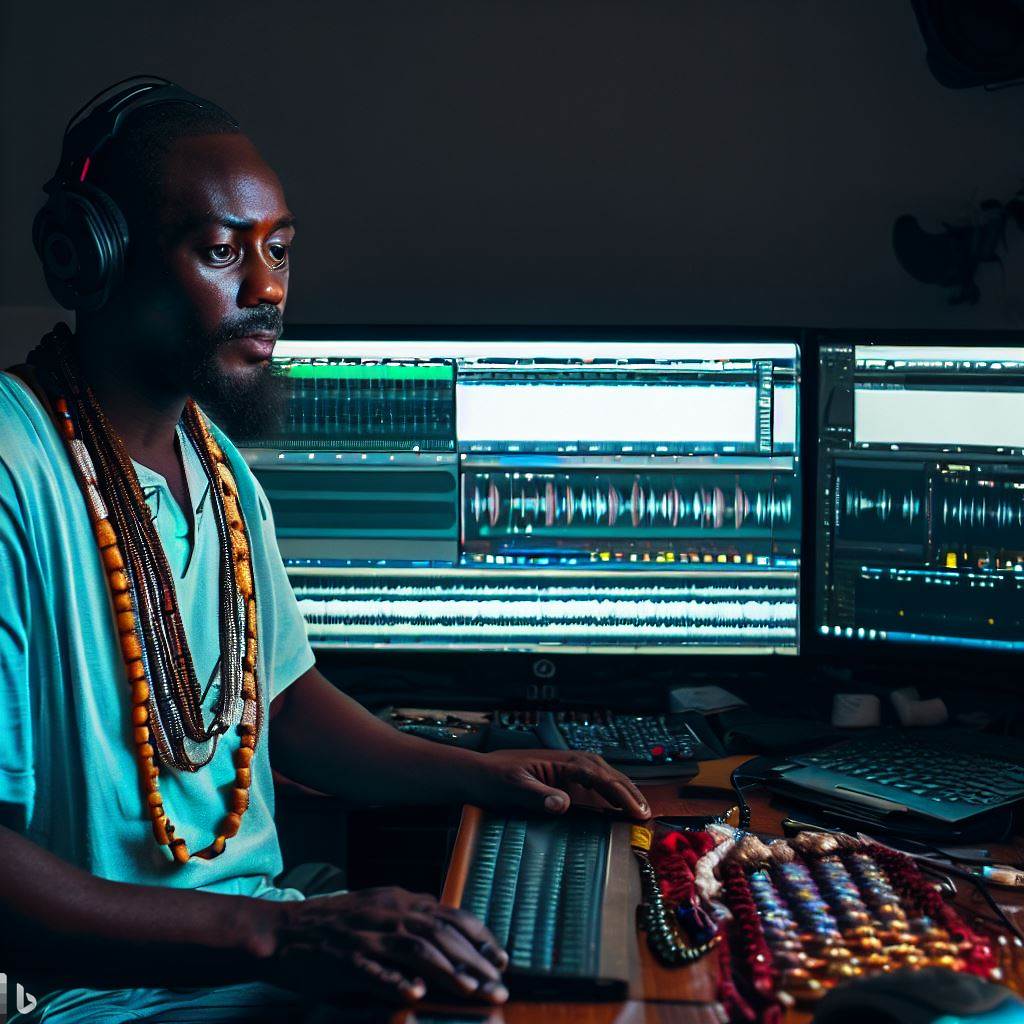Introduction
A sound effects editor is responsible for creating and manipulating audio elements to enhance visual media.
Sound effects play a crucial role in various industries, including film, television, gaming, advertising, and theater.
Step into the dynamic world of a Nigerian Sound Effects Editor. Craft sonic experiences, shape emotions, and transform storytelling.
Juggle diverse sounds, from bustling markets to serene landscapes.
Collaborate with filmmakers, adding depth to their vision. Employ state-of-the-art tools, channeling creativity into auditory magic.
Balance deadlines, perfecting auditory perfection. Uncover the challenges and triumphs through firsthand accounts.
Embrace a life where each sound captures a tale.
Overview of Nigerian Sound Effects Editor
Growing demand for sound effects editors in Nigeria
The demand for sound effects editors in Nigeria is rapidly increasing due to the growth of the entertainment industry. The demand for sound effects editors in Nigeria is soaring.
Film and media industries seek skilled professionals. Sonic storytelling enhances immersion.
Every scene comes alive through skillful audio manipulation. Advanced technology elevates the craft.
From blockbuster movies to advertising, audio excellence drives success.
Collaborative projects thrive on expertly crafted soundscapes. Career prospects expand for those mastering this art.
As demand surges, opportunities for growth multiply. Studios and creators recognize the impact of quality sound.
A soundscape sets the mood, evokes emotion.
Skilled editors are the architects of auditory brilliance. This demand transcends entertainment, spanning into gaming, virtual reality, and more.
The future promises an even greater need. Pursuing this career opens doors to innovation and creativity.
In a world inundated with content, sound editors carve distinctive identities.
The growth potential is undeniable, making sound editing an exciting avenue.
Role and responsibilities of a Nigerian sound effects editor
An active Nigerian sound effects editor shapes auditory experiences by meticulously selecting, creating, and integrating sounds.
They enhance storytelling, emotion, and immersion, collaborating with filmmakers to ensure audio-visual harmony.
Employing cutting-edge tools, they balance creativity with technical finesse while meeting project deadlines with sonic perfection.
Crafting unique soundscapes for movies, TV shows, and games, they amplify realism, heighten tension, and evoke nostalgia.
Collaborating with sound designers, directors, and producers, they transform raw audio into captivating art, maintaining organized sound libraries for efficient access.
They stay updated on industry trends, innovate, adapt to diverse genres and styles, and listen with a critical ear to refine details.
In turn, they shape the audience’s perception and engagement, contributing profoundly to audiovisual storytelling. Their role is pivotal in creative production.
Importance of their work in the Nigerian entertainment industry
In the Nigerian entertainment industry, their work is crucial. It enhances production quality, immerses audiences, adds emotions, drives engagement, and impacts.
The dynamic work enhances storytelling, collaborates across disciplines, amplifies cultural representation, and defines audio identities.
It fuels audience connections, elevates recognition, and enables a competitive edge while shaping industry evolution.
Daily Routine
A typical day in the life of a Nigerian sound effects editor
A typical day in the life of a Nigerian sound effects editor is filled with creativity and attention to detail.
Sunrise to sunset, a Nigerian sound effects editor immerses in creativity. Soundscapes burst forth. Perfect clips are found.
Footsteps, raindrops, heartbeats aligned emotions heightened through audio. Seamless collaboration syncs sounds and Artistic intuition balances finesse.
Crafting unique auditory marvels perfecting tapestries, meeting deadlines experimenting with sound, ensuring harmony. Sonic exploration fills the day.
Typical working hours and schedule
They have a schedule that revolves around working hours but may be subject to change depending on project deadlines and client demands.
The working hours of a sound effects editor in Nigeria can vary, but most commonly they start their day in the morning and work until late evening.
They collaborate with directors, producers, and team members, crucially enhancing audio in film, TV, and gaming.
Tasks that they perform throughout the day
Throughout the day, the sound effects editor performs various tasks to ensure the audio elements are synchronized, clear, and impactful.
They start by reviewing the footage or gameplay to understand the specific requirements of each scene.
They then work on searching for existing sound effects libraries or creating their own unique sounds.
Communication is a vital aspect of their routine, as they regularly interact with producers and directors to discuss their vision and present sample sound effects.
Collaboration plays a crucial role in meeting the expectations of the project and ensuring that the audio enhances the overall experience.
The sound effects editor spends a significant amount of time meticulously editing the audio files.
They adjust the volume, manipulate frequencies, and precisely synchronize the sound effects with the visuals.
This attention to detail is essential for creating a seamless and immersive auditory experience.
Read: Market Demand for Sound Effects Editors in Nigeria
Gathering and Creating Sound Effects
Process of collecting or recording sound effects
The process of collecting or recording sound effects is a crucial part of a Nigerian sound effects editor’s job.
They are responsible for finding the perfect sound effects that fit the scene and enhance the storytelling.
Challenges faced by Nigerian sound effects editors in finding specific sound effects
Nigerian sound effects editors often face challenges in finding specific sound effects due to limited access to professional libraries.
They have to rely on their creativity and resourcefulness to find or create the desired sounds.
This may involve using everyday objects to produce unique sounds or recording ambient noises in different locations.
Creativity involved in creating unique sound effects
The creativity involved in creating unique sound effects is immense.
Sound effects editors in Nigeria often have to think outside the box and experiment with different techniques to achieve the desired result.
This involves manipulating sounds, layering different elements, and using various audio effects to create a truly immersive auditory experience.
The sound effects editor partners with composers and foley artists for cohesive audio integration in post-production.
This collaborative effort helps in creating a cohesive and captivating audio experience for the audience.
In short, the daily routine of a Nigerian sound effects editor involves a mix of creativity, technical skills, and collaboration.
They work diligently to gather or create the perfect sound effects, overcome challenges, and enhance the overall audio experience of films, TV shows, or video games.
Despite the limitations they may face, their dedication to their craft shines through as they strive to deliver high-quality audio.
Read: How to Become a Sound Effects Editor in Nigeria
Collaborating with Other Professionals
In the field of sound effects editing, collaboration with other professionals is of utmost importance.
Working closely with directors, producers, and other stakeholders ensures the success of a project.
The Importance of Collaboration
- Enhancing Creativity: Collaborating with professionals from different backgrounds brings fresh ideas and perspectives to the table, resulting in innovative sound effects.
- Ensuring Coherence: Collaborative efforts ensure that sound effects align with the overall vision of the project, creating a harmonious audiovisual experience.
- Effective Problem Solving: Collaborative teamwork allows for the identification and resolution of issues or challenges that may arise during the sound editing process.
- Learning and Growth: Collaboration provides an opportunity to learn from others and expand one’s skill set, fostering professional development.
Interaction between Sound Effects Editors and Stakeholders
- Directors: Sound effects editors work closely with directors to understand their creative vision and translate it into sound.
They collaborate to achieve desired emotions and enhance storytelling. - Producers: Collaboration with producers is essential to comprehend the project’s budgetary and time constraints, ensuring efficient allocation of resources.
- Other Stakeholders: Working with composers, cinematographers, and visual effects artists integrates sound seamlessly into the production.
Challenges in Aligning Sound Effects with Vision
- Interpretation: Sound effects editors must accurately interpret the director’s vision and determine the appropriate audio elements to create the desired impact.
- Communication: Effective communication is crucial to understand and translate directors’ feedback and make adjustments accordingly.
- Time Constraints: Working within tight deadlines can pose challenges in ensuring that the final sound effects align seamlessly with the director’s vision.

Sector-Specific Responsibilities
Sound Effects Editing in Different Sectors
Sound effects editors play a crucial role in various sectors, including film, television, radio, gaming, and more. While their core responsibilities remain the same, the specific tasks may vary.
Core duties remain consistent, yet tasks differ. In film, editors synchronize audio, shaping scenes. For television, they refine dialogue clarity.
In radio, they create immersive audio stories. In gaming, they craft interactive soundscapes.
Despite context shifts, the essence of enhancing auditory experiences persists. Their adaptable skills define sector success.
Varying Daily Life in Different Sectors
- Film: In the film industry, sound effects editors collaborate with the sound design team to create a rich auditory experience, aligning with the narrative and visual elements.
- Television: In television, sound effects editors work on tight schedules, delivering high-quality audio for multiple episodes, collaborating closely with the post-production team.
- Radio: Sound effects editors in radio focus on creating highly immersive soundscapes that engage listeners and enhance the storytelling experience.
- Gaming: Gaming sound effects editors create interactive audio that responds to the players’ actions and movements, immersing them in the game world.
Impact on the Final Product
The work of sound effects editors significantly influences the overall quality of the final product.
- Immersion: Well-crafted sound effects intensify the audience’s immersion, allowing them to fully engage with the visuals and storyline.
- Emotional Impact: Sound effects have the power to evoke specific emotions, enhancing the audience’s connection with characters and scenes.
- Realism: Authentic and well-synced sound effects lend credibility and realism to the on-screen events, enriching the viewer’s experience.
Collaboration and sector-specific responsibilities are essential elements of a Nigerian sound effects editor’s daily life.
The intersection of creativity, teamwork, and technical expertise ensures the successful delivery of compelling sound effects for a diverse range of projects.
Read: Tools Every Nigerian Sound Effects Editor Needs
Equipment and Tools
As technology advances, Nigerian sound effects editors rely on various equipment and software to enhance their work.
Staying updated with the latest technology is crucial to provide high-quality sound effects in the industry.
However, there are specific challenges faced by these editors in terms of accessing and affording necessary equipment.
Equipment and software commonly used by Nigerian sound effects editors
Nigerian sound effects editors commonly use a range of equipment and software to carry out their work efficiently. These include:
- Computers: High-performance computers are essential for running sophisticated sound editing software smoothly.
- Digital Audio Workstations (DAWs): Software programs like Pro Tools, Logic Pro, and Adobe Audition are widely used for sound editing and mixing.
- Recording Devices: Sound editors use professional-grade microphones and audio recorders to capture high-quality sounds.
- Plugins and Effects: Various plugins and effects are used to manipulate and enhance sounds, such as reverbs, equalizers, and compressors.
- Studio Monitors and Headphones: Accurate monitoring is crucial, so sound editors rely on high-quality studio monitors and headphones.
- MIDI Controllers: These devices enable sound editors to control virtual instruments and manipulate MIDI data.
Importance of Staying Updated with the Latest Technology and Advancements in the Field
Staying updated with the latest technology and advancements in the field is vital for Nigerian sound effects editors.
It ensures that they can offer cutting-edge techniques and tools to their clients.
By keeping up with industry trends, they remain competitive and relevant in the ever-evolving sound editing landscape.
Challenges Faced by Nigerian sound effects editors
One of the significant challenges faced by Nigerian sound effects editors is the limited access to necessary equipment.
High-quality sound editing equipment can be expensive and not readily available in local markets.
This makes it difficult for editors to acquire the tools they need to deliver top-notch work.
Moreover, the cost of software licenses and updates can also be a financial burden for freelance editors or those working independently.
These obstacles can hinder sound editors in providing their services at the level they aspire to.
See Related Content: Profiles of Successful Nigerian Performers’ Agents
Constant Learning and Growth
In the field of sound effects editing, continuous learning is crucial for Nigerian professionals to stay at the forefront of their craft.
It is essential to understand the need to stay updated with industry trends and techniques, which allows for personal and professional growth.
Fortunately, there are resources and platforms available for Nigerian sound effects editors to enhance their skills and stay connected with the industry.
Importance of Continuous Learning
As technology progresses, sound effects editing techniques evolve.
It is important for Nigerian editors to keep learning and mastering new skills to meet the demands of the industry.
Continuous learning ensures they remain competitive, versatile, and capable of providing innovative sound effects solutions.
Publish Your Professional Profile, Business or Brand
Showcase your expertise, gain trust, and boost visibility instantly on Professions.ng.
Publish NowStaying Updated with Industry Trends
The sound effects industry is constantly evolving, with new trends and techniques emerging regularly.
Nigerian editors need to stay updated with these trends to offer the latest and most in-demand services.
This includes keeping track of new soundscapes, popular genres, and emerging sound design trends.
Resources and Platforms
To enhance their skills and stay connected with the industry, Nigerian sound effects editors can utilize the following resources and platforms:
- Online Tutorials and Courses: Websites like YouTube, Udemy, and LinkedIn Learning offer a wide range of sound editing tutorials and courses.
- Sound Effects Libraries: Accessing extensive sound libraries helps editors expand their collections and find unique sounds for their projects.
Websites like Freesound and Soundsnap offer a vast collection of sound effects. - Online Communities and Forums: Platforms such as Gearslutz and Sound Design Stack Exchange facilitate discussions and knowledge exchange among sound editors.
- Industry Conferences and Workshops: Conferences and workshops offer networking and trend insights for industry growth.
- Social Media: Tracking pros and leaders on Twitter, Facebook keeps editors current, fostering connections and shared interests.
In essence, Nigerian sound effects editors heavily rely on equipment and software to enhance their work.
Staying updated with the latest technology is vital, despite challenges in accessing and affording necessary equipment.
Ongoing learning and trend tracking ensure editor success. Abundant resources and platforms foster skill growth and industry ties.
Read: Challenges Faced by Sound Effects Editors in Nigeria
Conclusion
The daily life of a Nigerian sound effects editor is a busy and fulfilling one.
They are responsible for enhancing the audio experience in various media such as movies, TV shows, and commercials.
Their role is essential in creating a realistic and immersive sound environment.
Aspiring sound effects editors in Nigeria should be encouraged to pursue their passion in this field.
With the growing demand for high-quality audio, there are plenty of opportunities for them to showcase their talent and creativity.
Nigeria’s entertainment industry is booming, providing a fertile ground for sound effects editors to thrive.
In a country known for its vibrant music and film culture, sound effects editors hold a crucial position in shaping the overall audio experience.
They contribute to bringing the audience into the world of the story, creating emotions, and enhancing the visual narrative.
So, if you have a passion for sound design and editing, don’t hesitate to pursue it in Nigeria.
With hard work, dedication, and a keen ear for detail, you can make a difference in the Nigerian entertainment industry.
Embrace the challenges, embrace the opportunities, and let your passion for sound effects editing shine.




